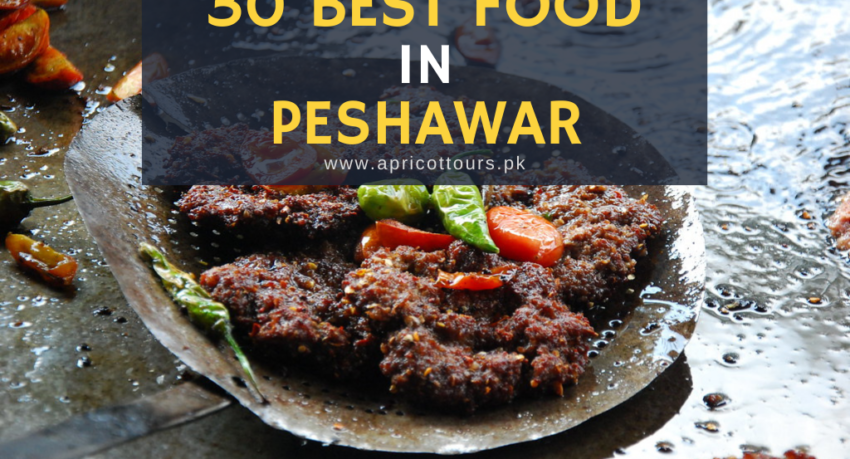Introduction
Welcome to the captivating world of food in Peshawar, a city revered for its vibrant culinary tapestry and diverse gastronomic heritage. Nestled in the heart of Pakistan, Peshawar beckons with an irresistible array of flavorful dishes that epitomize the region’s rich cultural identity. Renowned for its aromatic spices, delectable meats, and an ingrained tradition of hospitality, food in Peshawar isn’t just sustenance—it’s an art form deeply embedded in the city’s fabric.
At the crossroads of ancient trade routes, Peshawar’s culinary landscape bears the imprints of centuries of cultural exchange. The city’s gastronomy, steeped in history, boasts influences from Mughal, Afghan, Central Asian, and Pashtun traditions, resulting in a delightful fusion of flavors and cooking techniques. Whether sizzling kebabs grilling on open flames or the tantalizing aromas wafting from bustling street food stalls, every bite tells a tale of heritage and craftsmanship.
The streets of Peshawar come alive with a kaleidoscope of tastes and textures, showcasing a treasure trove of delights for every palate. From the iconic Chapli Kebabs, boasting a symphony of spices and minced meats, to the aromatic Peshawari Pulao brimming with fragrant rice and succulent mutton, each dish embodies a story of culinary prowess passed down through generations.
Steeped in tradition, Peshawar’s street food culture is a spectacle in itself, offering an immersive experience where locals and visitors converge to indulge in the city’s gastronomic delights. Amidst the hustle and bustle, the narrow alleys are lined with vendors serving up specialties like the Peshawari Naan, a fragrant flatbread baked to perfection in traditional tandoors, and Namkeen Tikka, tantalizing skewers of marinated meat grilled to smoky perfection.
Food in Peshawar isn’t just a meal; it’s an expression of community, hospitality, and cultural pride. It forms the cornerstone of social gatherings, religious celebrations, and everyday life, reflecting the warmth and generosity ingrained in the region’s cultural ethos. Join us on a culinary journey through the bustling streets and hidden gems to discover the soul-stirring flavors and traditions that define food in Peshawar.
List of 30 Top Food in Peshawar
| S. No | Name of Food/Dish | Category | Price Range (USD & EUR) | Main Ingredients (if available) |
|---|---|---|---|---|
| 1 | Chapli Kebab | Savory | $5-$15 USD, €4-€12 EUR | Minced meat, spices, herbs |
| 2 | Peshawari Karahi | Meat Dish | $10-$25 USD, €8-€20 EUR | Meat (usually chicken or lamb), tomatoes, spices |
| 3 | Namkeen Tikka | Savory | $8-$20 USD, €6-€16 EUR | Marinated meat, spices |
| 4 | Peshawari Naan | Bread | $1-$5 USD, €1-€4 EUR | Flour, yeast, sometimes stuffed with nuts or dried fruits |
| 5 | Kabuli Pulao | Rice Dish | $8-$18 USD, €6-€15 EUR | Basmati rice, meat, carrots, raisins, nuts |
| 6 | Shinwari Tikka | Meat Dish | $12-$30 USD, €10-€25 EUR | Grilled meat, spices |
| 7 | Seekh Kebab | Savory | $6-$15 USD, €5-€12 EUR | Minced meat, spices |
| 8 | Dalcha | Savory | $7-$20 USD, €6-€16 EUR | Lentils, meat, spices |
| 9 | Peshawari Ice Cream | Dessert | $3-$8 USD, €2-€7 EUR | Milk, sugar, various flavors |
| 10 | Mutton Karahi | Meat Dish | $12-$30 USD, €10-€25 EUR | Mutton, tomatoes, spices |
| 11 | Peshawari Chapati | Bread | $1-$4 USD, €1-€3 EUR | Whole wheat flour |
| 12 | Peshawari Sajji | Meat Dish | $15-$35 USD, €12-€30 EUR | Whole roasted meat, spices |
| 13 | Mutton Peshawari Karahi | Meat Dish | $15-$35 USD, €12-€30 EUR | Mutton, tomatoes, spices |
| 14 | Peshawari Charsi Tikka | Meat Dish | $10-$25 USD, €8-€20 EUR | Grilled meat, spices |
| 15 | Peshawari Falooda | Dessert | $4-$10 USD, €3-€8 EUR | Vermicelli, rose syrup, ice cream |
| 16 | Beef Peshawari Karahi | Meat Dish | $12-$30 USD, €10-€25 EUR | Beef, tomatoes, spices |
| 17 | Tandoori Chicken | Meat Dish | $8-$20 USD, €6-€16 EUR | Chicken, yogurt, spices |
| 18 | Peshawari Qahwa | Beverage | $2-$5 USD, €1.5-€4 EUR | Green tea, cardamom, saffron |
| 19 | Peshawari Kulfi | Dessert | $2-$6 USD, €1.5-€5 EUR | Milk, sugar, nuts, flavors |
| 20 | Peshawari Mutton Pulao | Rice Dish | $10-$25 USD, €8-€20 EUR | Basmati rice, mutton, spices |
| 21 | Peshawari Handi | Meat Dish | $10-$30 USD, €8-€25 EUR | Meat, yogurt, spices |
| 22 | Peshawari Special Karahi | Meat Dish | $15-$35 USD, €12-€30 EUR | Special mix of meat, tomatoes, spices |
| 23 | Afghan Pulao | Rice Dish | $10-$25 USD, €8-€20 EUR | Basmati rice, meat, raisins, carrots |
| 24 | Peshawari Sheer Khurma | Dessert | $4-$10 USD, €3-€8 EUR | Vermicelli, milk, nuts, spices |
| 25 | Peshawari Chana Chaat | Savory | $3-$8 USD, €2-€7 EUR | Chickpeas, spices, herbs |
| 26 | Peshawari Kheer | Dessert | $3-$7 USD, €2-€6 EUR | Rice, milk, sugar, nuts |
| 27 | Peshawari Kofta | Meat Dish | $8-$20 USD, €6-€16 EUR | Meatballs, spices, sauce |
| 28 | Peshawari Saji | Meat Dish | $10-$25 USD, €8-€20 EUR | Roasted meat, spices |
| 29 | Peshawari Aloo Gosht | Meat Dish | $8-$18 USD, €6-€15 EUR | Meat, potatoes, spices |
| 30 | Peshawari Seekh Kebab | Savory | $6-$15 USD, €5-€12 EUR | Minced meat, spices |
| S. No | Name of Food/Dish | Category | Price Range (USD & EUR) | Main Ingredients (if available) |
Note: The price range provided is approximate and may vary depending on the restaurant or vendor.
Chapli Kebab: Originating from the Khyber Pakhtunkhwa region, Chapli Kebab is a beloved Pashtun dish known for its distinct round, flattened shape and rich flavors. It’s made by blending minced meat (usually beef or lamb) with various spices like coriander, cumin, chili, and sometimes pomegranate seeds or tomatoes. The mixture is shaped into flat patties and traditionally cooked on a hot iron skillet with a drizzle of oil. The kebabs are served with naan or rice, accompanied by fresh salad and chutneys.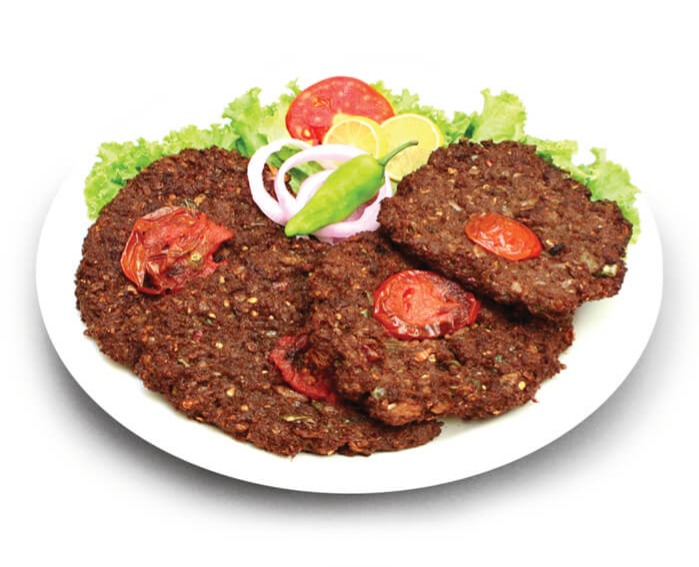
Peshawari Karahi: This dish represents the vibrant flavors of Peshawar with its aromatic and spicy gravy. It typically features tender meat (commonly chicken or lamb) cooked in a karahi (a type of wok) with a blend of tomatoes, garlic, ginger, green chilies, and a medley of spices like cumin, coriander, and garam masala. The dish is known for its robust taste, often served with naan or chapati, making it a staple at Peshawari dining tables.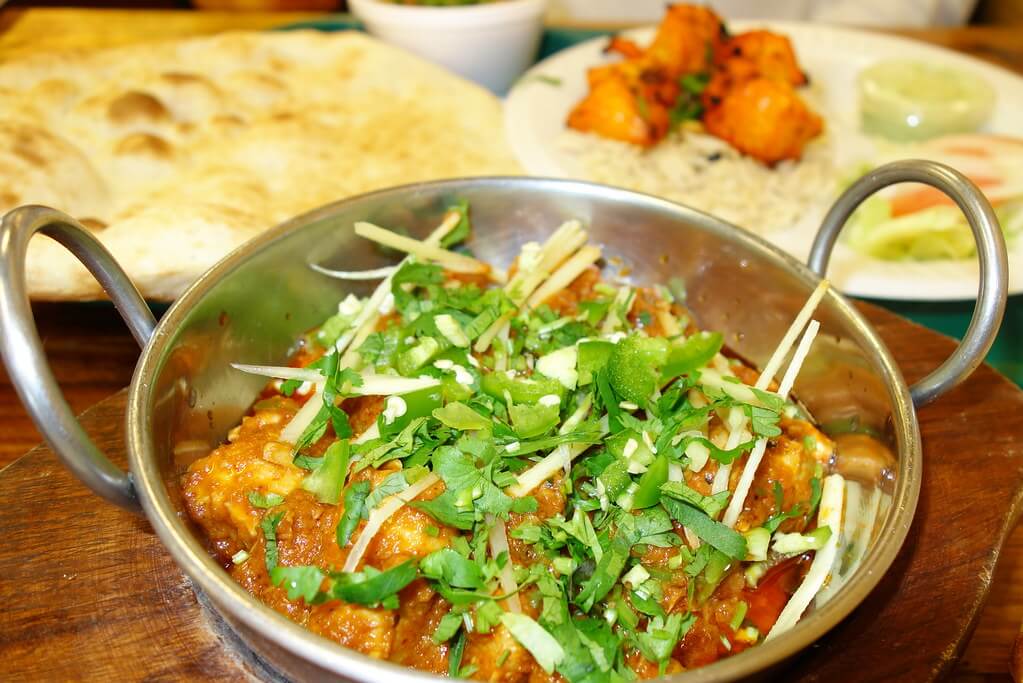
Namkeen Tikka: A savory delight, Namkeen Tikka comprises succulent pieces of marinated meat (usually chicken or beef) skewered and grilled to perfection. The marinade typically includes yogurt, spices like red chili powder, cumin, and ginger-garlic paste, lending the meat its flavorful and mildly spicy taste. Served hot off the grill with naan or rice, this dish is a favorite among barbecue enthusiasts.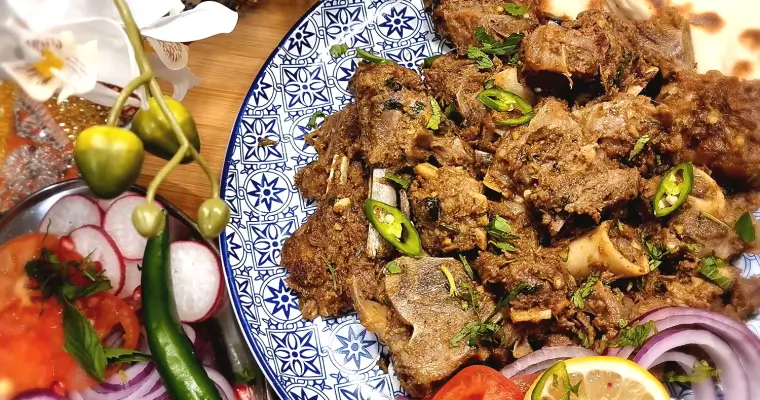
Peshawari Naan: Peshawari Naan is a flavorful flatbread renowned for its unique preparation. The dough is kneaded with milk, sometimes yogurt, and seasoned with nigella seeds, sesame seeds, and poppy seeds. This naan is then baked in a tandoor, resulting in a soft, slightly sweet bread with a distinct aroma and taste. It pairs wonderfully with various gravies or can be savored on its own.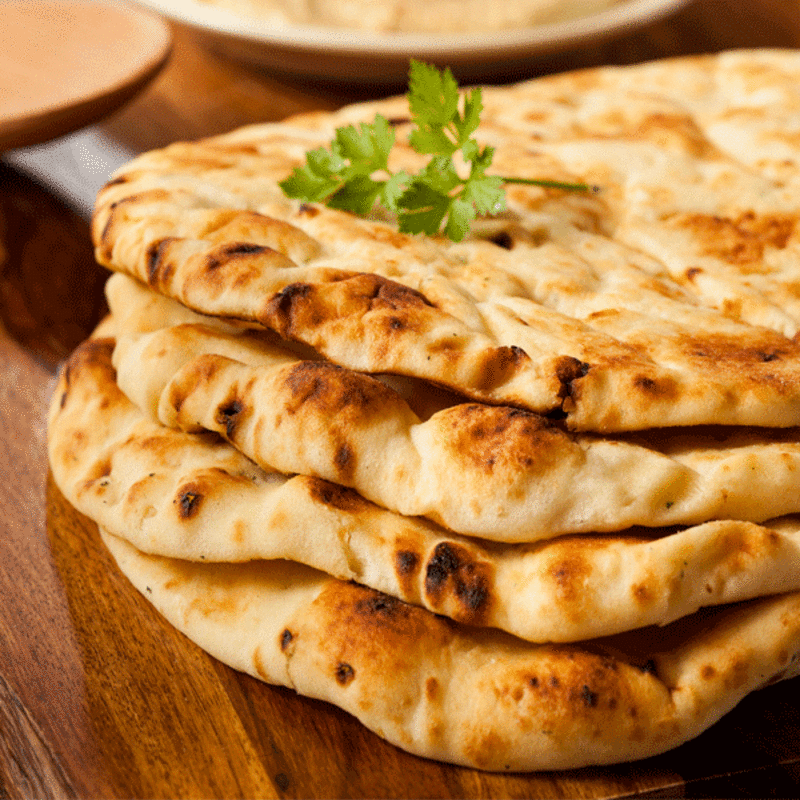
Kabuli Pulao: Originating from Afghanistan but popular in Peshawar, Kabuli Pulao is a fragrant rice dish cooked with aromatic spices, caramelized carrots, raisins, and nuts like almonds or pistachios. The rice is usually flavored with cardamom, cloves, and cinnamon, creating a delightful mix of sweet and savory flavors. Often prepared with lamb or chicken, Kabuli Pulao is a hearty and celebratory dish, enjoyed during special occasions.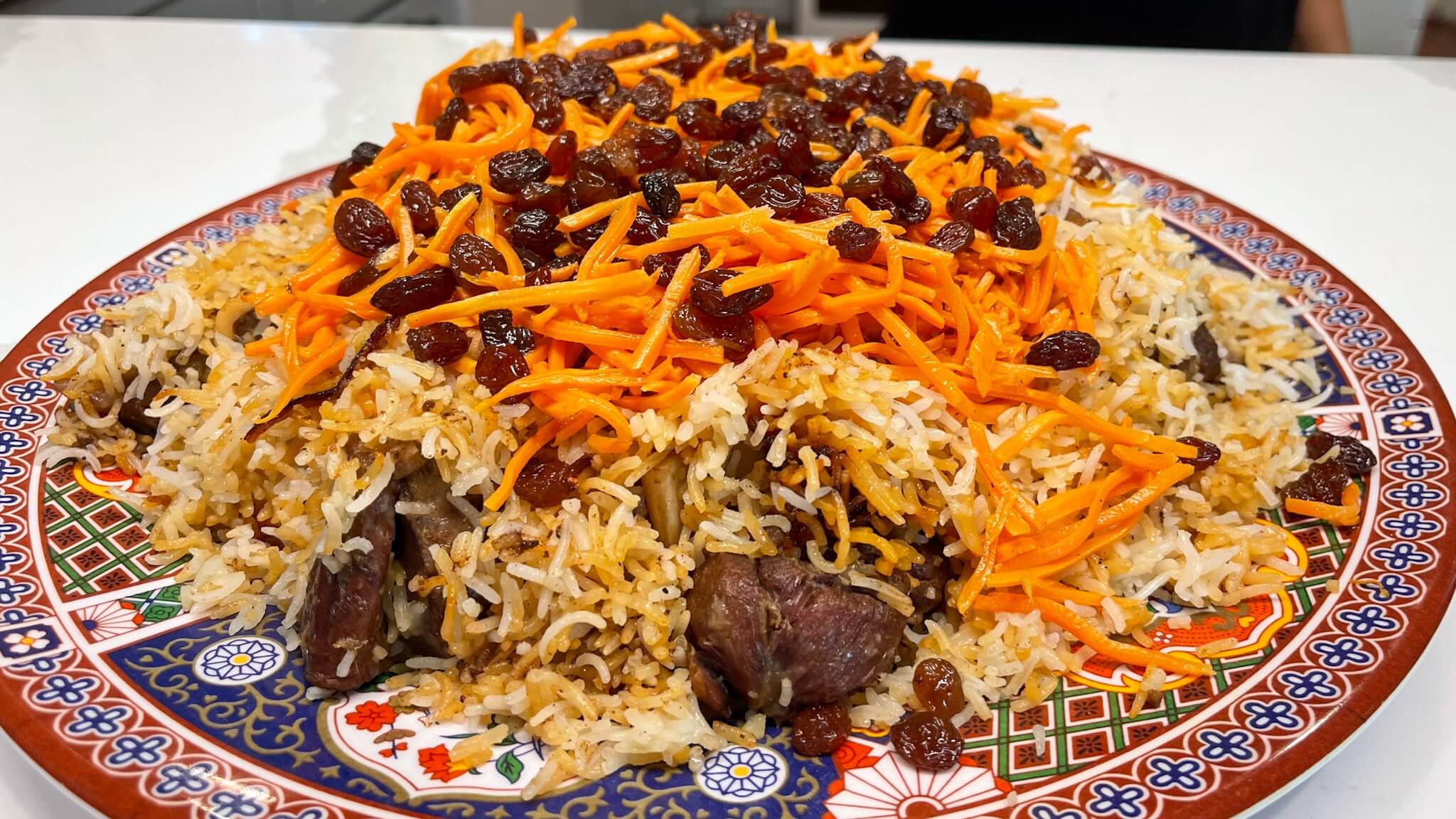
Shinwari Tikka: Hailing from the Pashtun cuisine, Shinwari Tikka features marinated chunks of meat, usually beef or lamb, grilled on open flames or charcoal, enhancing the smoky flavor. The marinade consists of yogurt, spices like coriander, black pepper, and papaya paste, tenderizing the meat and infusing it with robust flavors. Served hot, this dish is a testament to the art of barbecuing in Peshawar.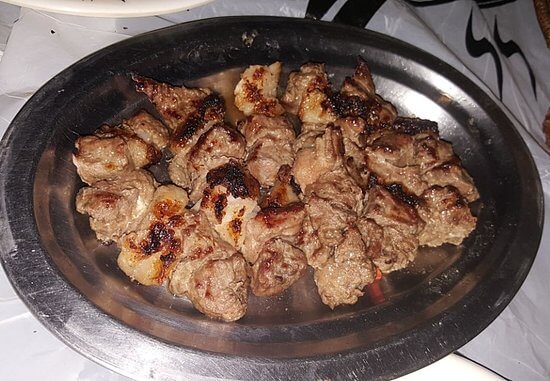
Seekh Kebab: Seekh Kebabs are minced meat kebabs molded onto skewers and grilled, known for their cylindrical shape and aromatic spices. The meat, often a blend of beef or lamb mixed with onions, garlic, coriander, and cumin, is shaped around the skewers and roasted until perfectly cooked. These kebabs are served with naan or rice, accompanied by mint chutney or yogurt sauce.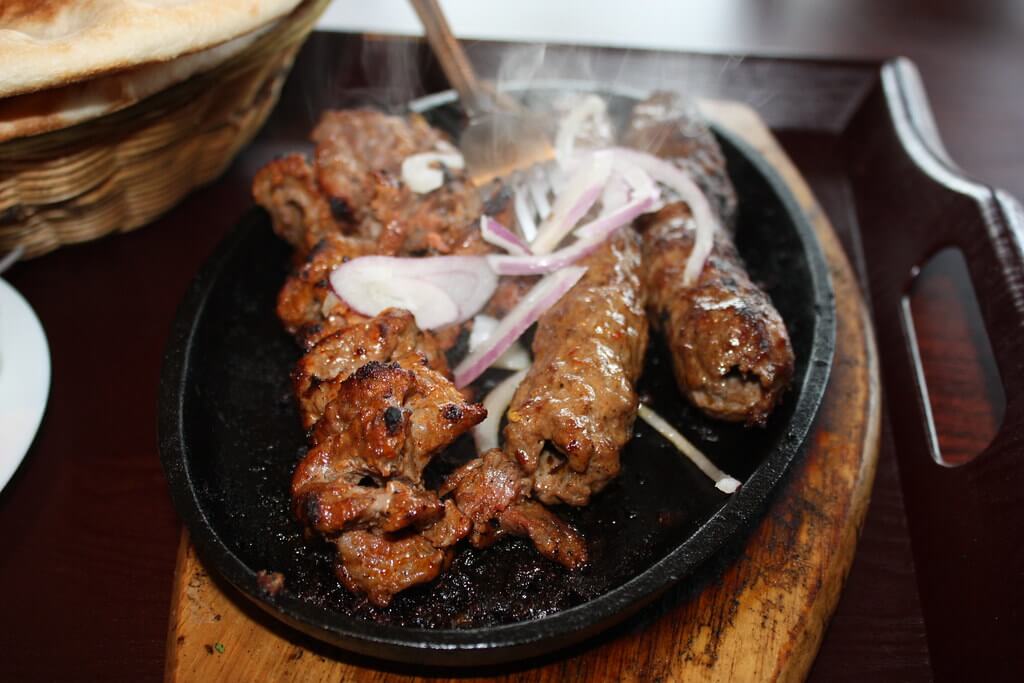
Dalcha: A comforting and hearty lentil stew, Dalcha combines lentils (often chana dal or split chickpeas) with meat, typically mutton or beef, cooked together with a blend of spices like turmeric, cumin, and garam masala. This flavorful dish is thickened to a rich consistency and enjoyed with naan or rice, offering a delightful balance of protein and comforting flavors.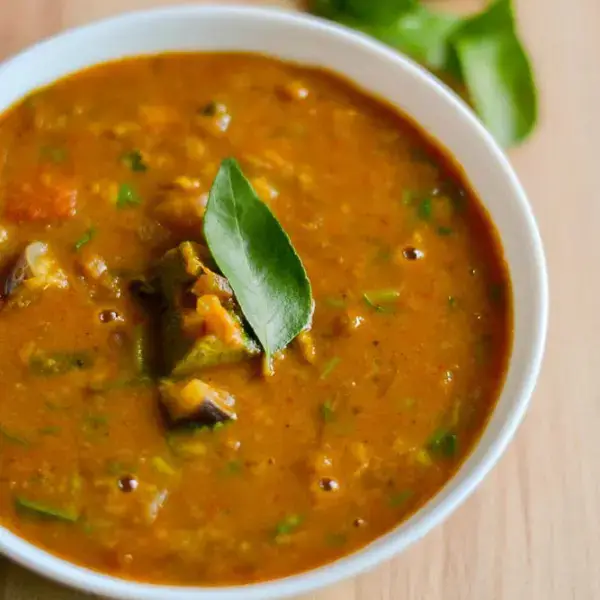
Peshawari Ice Cream: Peshawari Ice Cream is a local delight known for its creamy texture and unique flavors. Prepared traditionally with reduced milk, and sugar, and often flavored with saffron, cardamom, and pistachios, this ice cream is churned to perfection, creating a dense and rich treat. It’s served in small, satisfying portions, allowing the flavors to shine through.
Peshawari Chapati: Peshawari Chapati is a type of unleavened flatbread made from whole wheat flour and cooked on a griddle or tawa. It’s often brushed with ghee or butter to enhance its flavor. This simple yet essential accompaniment to many Peshawari dishes complements curries, kebabs, and other savory dishes.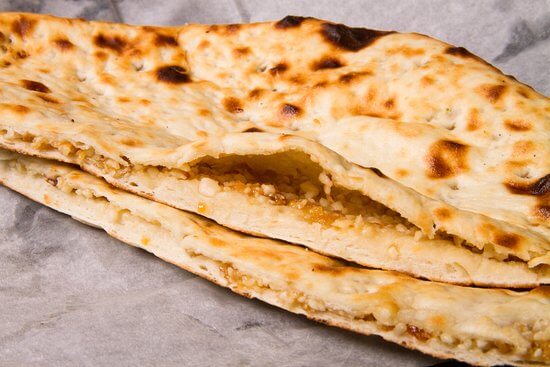
Peshawari Sajji: Sajji is a whole roasted meat dish, traditionally prepared with a whole chicken or lamb, marinated in a blend of spices and herbs, including salt, black pepper, and sometimes green papaya paste for tenderness. The marinated meat is slow-roasted on a skewer or spit, resulting in succulent, flavorful meat that’s crispy on the outside and tender on the inside.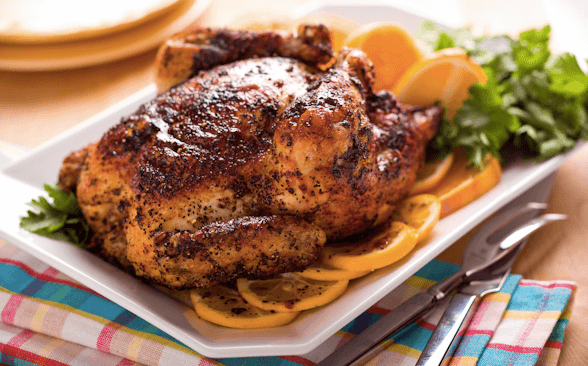
Peshawari Charsi Tikka: Charsi Tikka, a flavorful and spicy barbecued dish, features marinated chunks of meat (usually chicken or beef) grilled to perfection. The marinade includes a blend of spices, yogurt, and often a special homemade spice mix, giving it a distinct taste. Served hot with naan and chutneys, this dish is a testament to the local barbecue culture.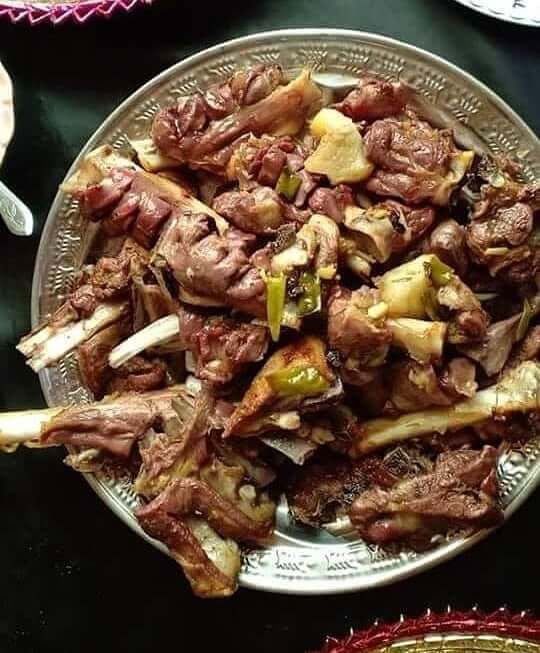
Tandoori Chicken: Tandoori Chicken is marinated chicken cooked in a tandoor, a cylindrical clay oven. The marinade typically includes yogurt, lemon juice, and a blend of spices such as red chili powder, turmeric, cumin, and garam masala. This cooking method imparts a smoky flavor to the chicken, resulting in juicy and flavorful meat that’s often served with naan and mint chutney.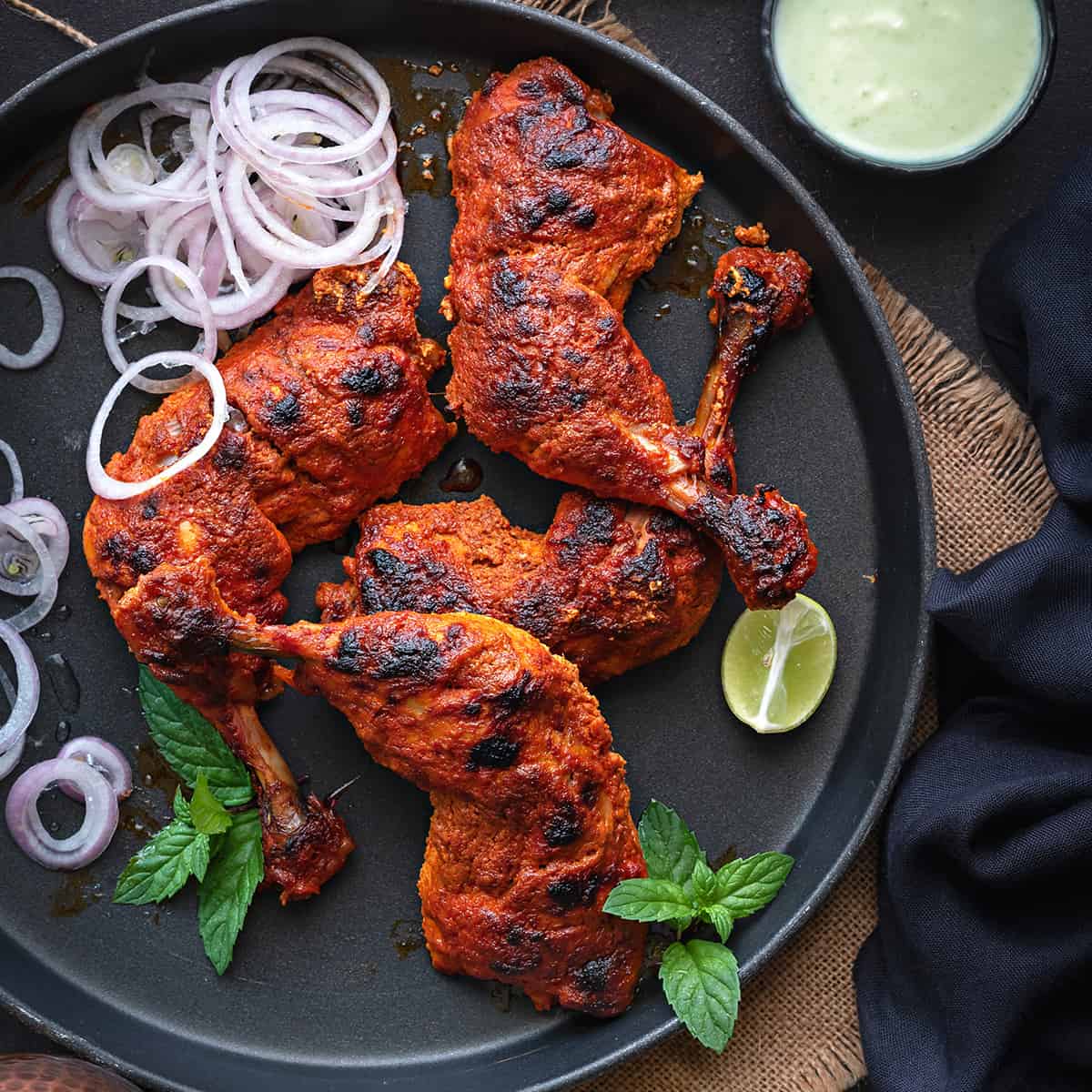
Peshawari Kheer: Peshawari Kheer is a creamy and aromatic rice pudding made with milk, rice, and sugar, and flavored with cardamom, saffron, and nuts like almonds or cashews. The rice is cooked in the milk until it thickens and achieves a creamy consistency. It’s a classic dessert often served during special occasions or family gatherings, offering a comforting and indulgent sweetness.
Peshawari Qahwa: Qahwa is a traditional Pashtun green tea infused with aromatic spices like cardamom, cinnamon, saffron, and sometimes cloves. It’s brewed with a unique method, simmered to extract the flavors of the spices, creating a soothing and aromatic beverage often served after meals or during gatherings.
Peshawari Kulfi: Peshawari Kulfi is a traditional frozen dessert loved for its dense, creamy texture and rich flavors. It’s made by simmering milk until it reduces and thickens, then sweetened with sugar and flavored with cardamom, saffron, and sometimes nuts like pistachios or almonds. The mixture is poured into molds and frozen until set, creating a delightful treat that’s often served on a stick or sliced into rounds.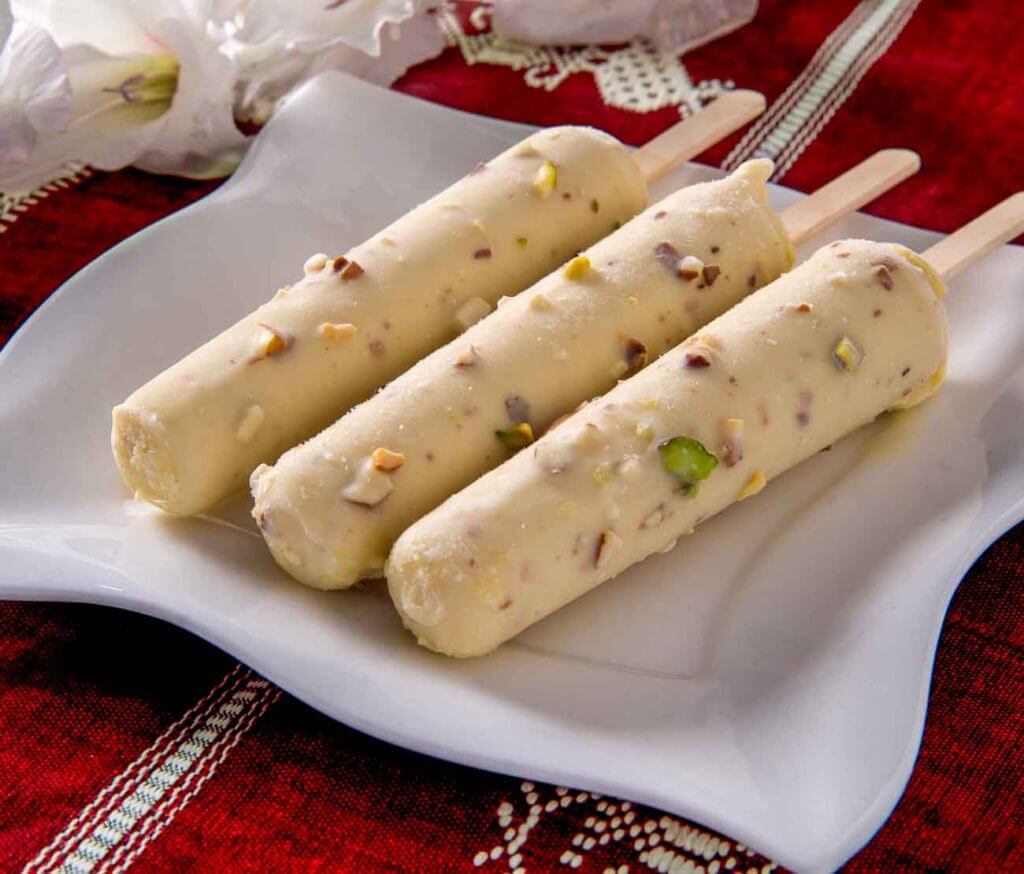
Peshawari Mutton Pulao: Peshawari Mutton Pulao is a fragrant rice dish cooked with tender pieces of mutton, basmati rice, and an array of aromatic spices. The meat is typically marinated with yogurt, ginger-garlic paste, and spices, then layered with partially cooked rice, allowing the flavors to meld together as the dish is cooked on a low flame. It’s garnished with caramelized onions, nuts, and fresh coriander, offering a delightful balance of spices and tender meat.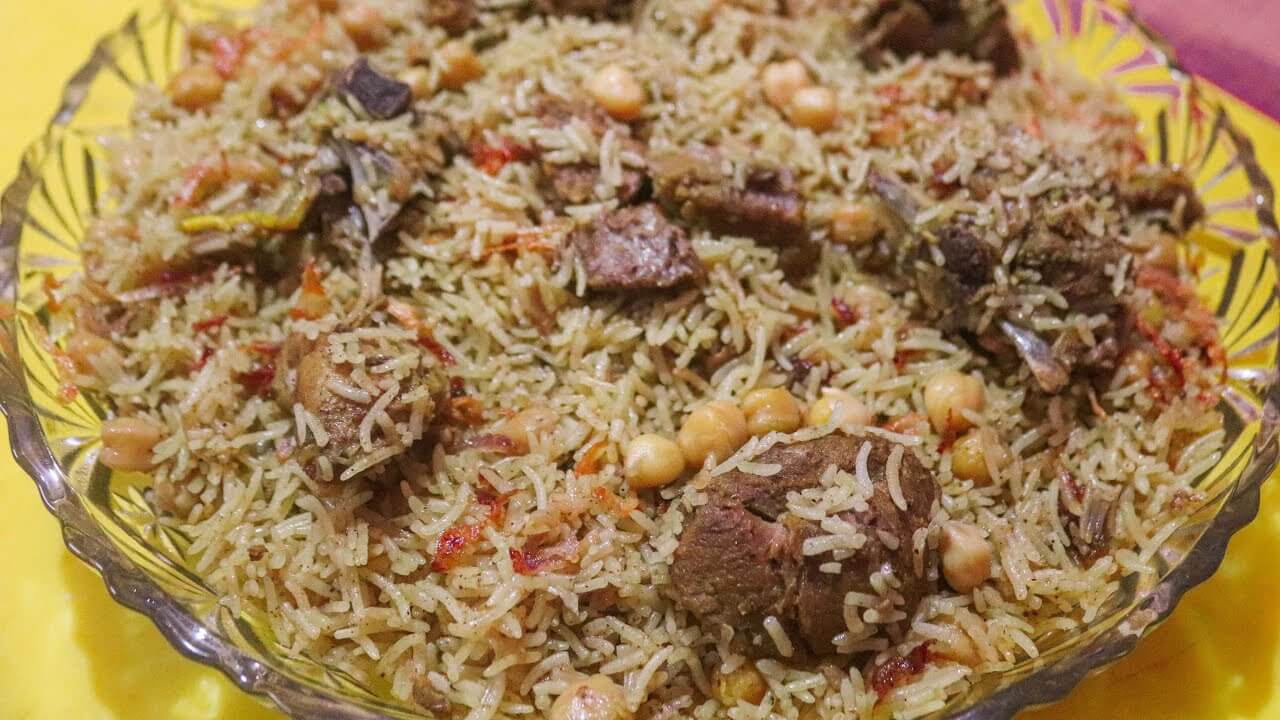
Peshawari Handi: Peshawari Handi is a slow-cooked curry dish made in a traditional handi (clay pot). It features tender pieces of meat, often chicken or mutton, cooked with tomatoes, onions, yogurt, and a blend of spices such as cumin, coriander, and garam masala. The slow cooking process in the handi allows the flavors to intensify, resulting in a rich and aromatic curry that’s typically served with naan or rice.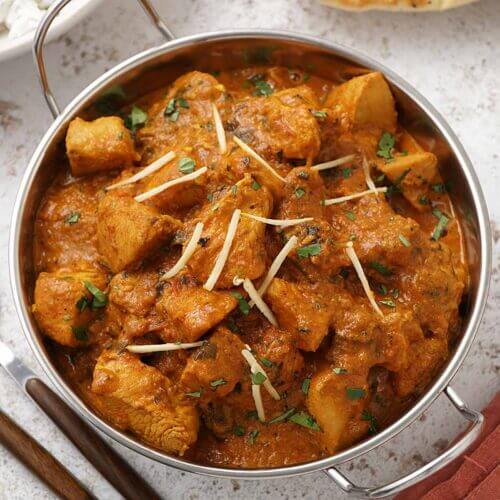
Afghan Pulao: Afghan Pulao, though originating from Afghanistan, is a popular dish in Peshawar. It’s a flavorful rice preparation cooked with aromatic spices like cardamom, cloves, cinnamon, caramelized carrots, raisins, and almonds. Often prepared with tender chunks of lamb or chicken, the dish boasts a perfect blend of sweet and savory flavors, making it a cherished item in Peshawari cuisine.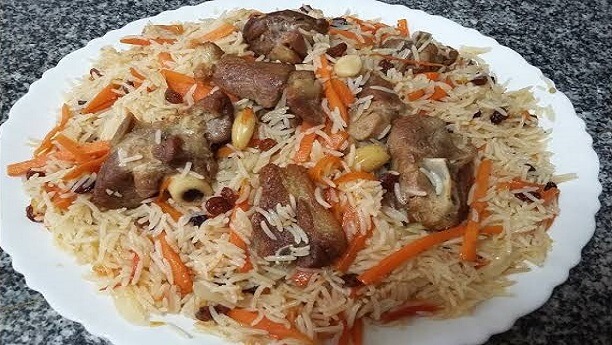
Peshawari Sheer Khurma: Peshawari Sheer Khurma is a festive dessert traditionally enjoyed during Eid celebrations. It’s a creamy and rich vermicelli pudding made by simmering thin vermicelli in milk until it softens. Sugar, dates, and nuts like almonds, pistachios, and cardamom are added to enhance their flavor. This dessert is often garnished with more nuts and served chilled, offering a delightful and comforting sweetness.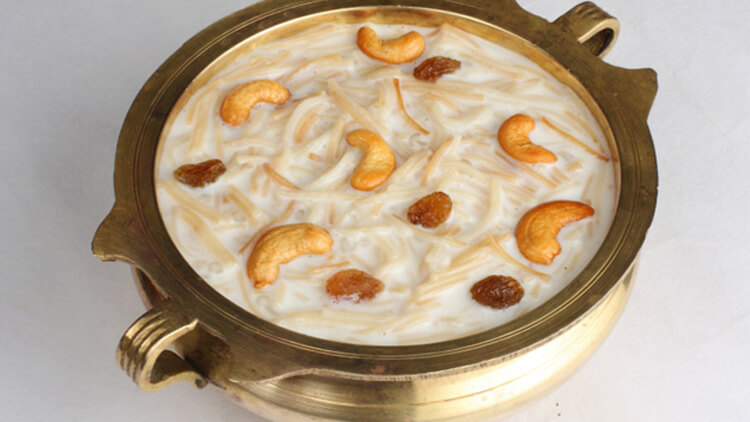
Peshawari Chana Chaat: Peshawari Chana Chaat is a zesty chickpea salad that’s a popular street food snack. Boiled chickpeas are mixed with chopped tomatoes, onions, green chilies, cilantro, and a blend of spices such as chaat masala, cumin, and tamarind chutney. The result is a refreshing and flavorful salad with a perfect balance of savory and tangy flavors, often enjoyed as a quick bite.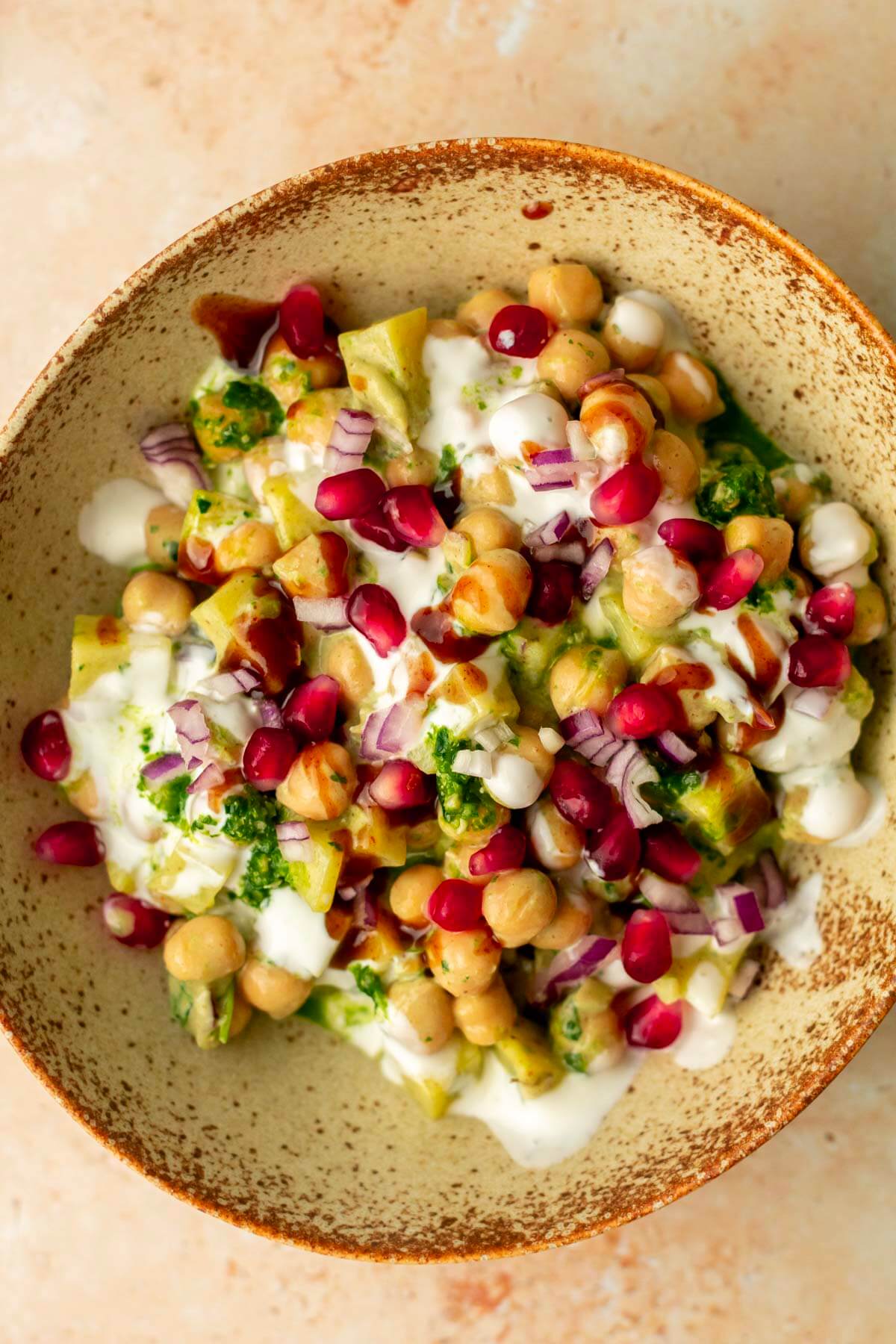
Peshawari Kofta: Peshawari Kofta is a dish comprising flavorful meatballs made with minced meat (often beef or chicken) mixed with onions, spices, and fresh herbs. The meatballs are simmered in a rich and savory gravy made with tomatoes, onions, yogurt, and a blend of spices, resulting in tender and juicy koftas that soak up the delicious flavors of the gravy.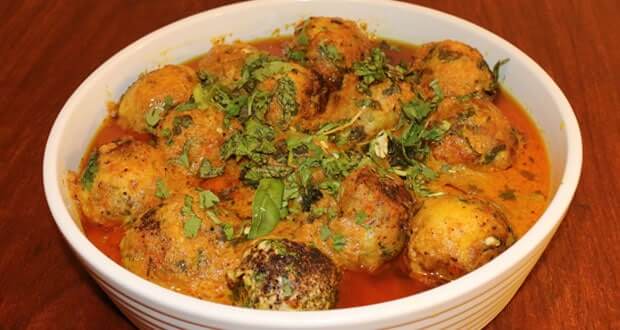
Peshawari Aloo Gosht: Peshawari Aloo Gosht is a comforting meat and potato curry cooked with a medley of spices. Tender pieces of meat, commonly mutton or beef, are simmered with potatoes, onions, tomatoes, and a mix of spices like cumin, coriander, and turmeric. This hearty and flavorful dish is a staple in Peshawari households, often served with naan or rice.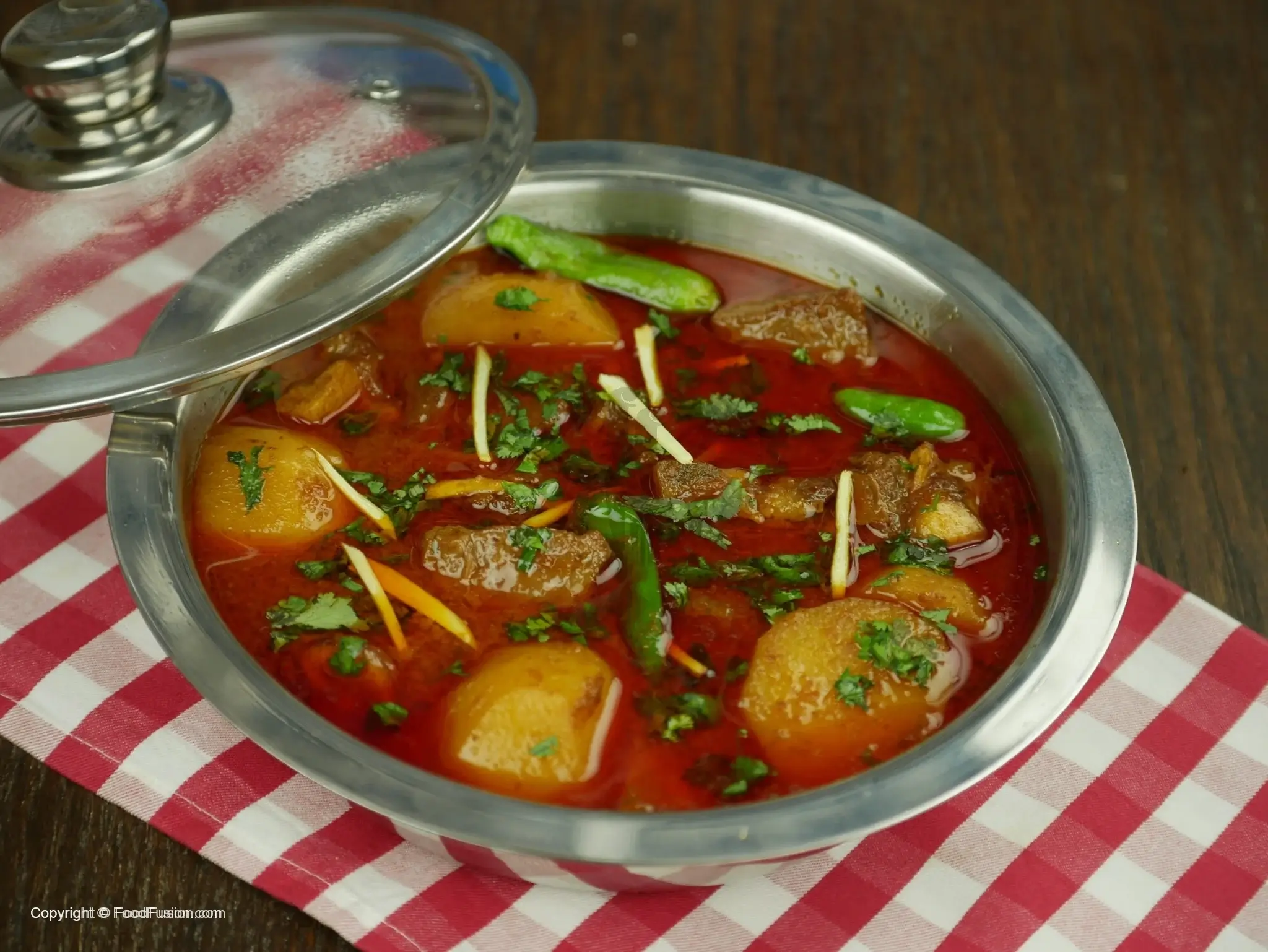
Mutton Peshawari Karahi: Mutton Peshawari Karahi is a spicy and aromatic dish featuring tender pieces of mutton cooked in a karahi (wok) with tomatoes, garlic, ginger, green chilies, and a blend of spices like cumin, coriander, and garam masala. This dish showcases the bold flavors of Peshawari cuisine, often enjoyed with naan or chapati.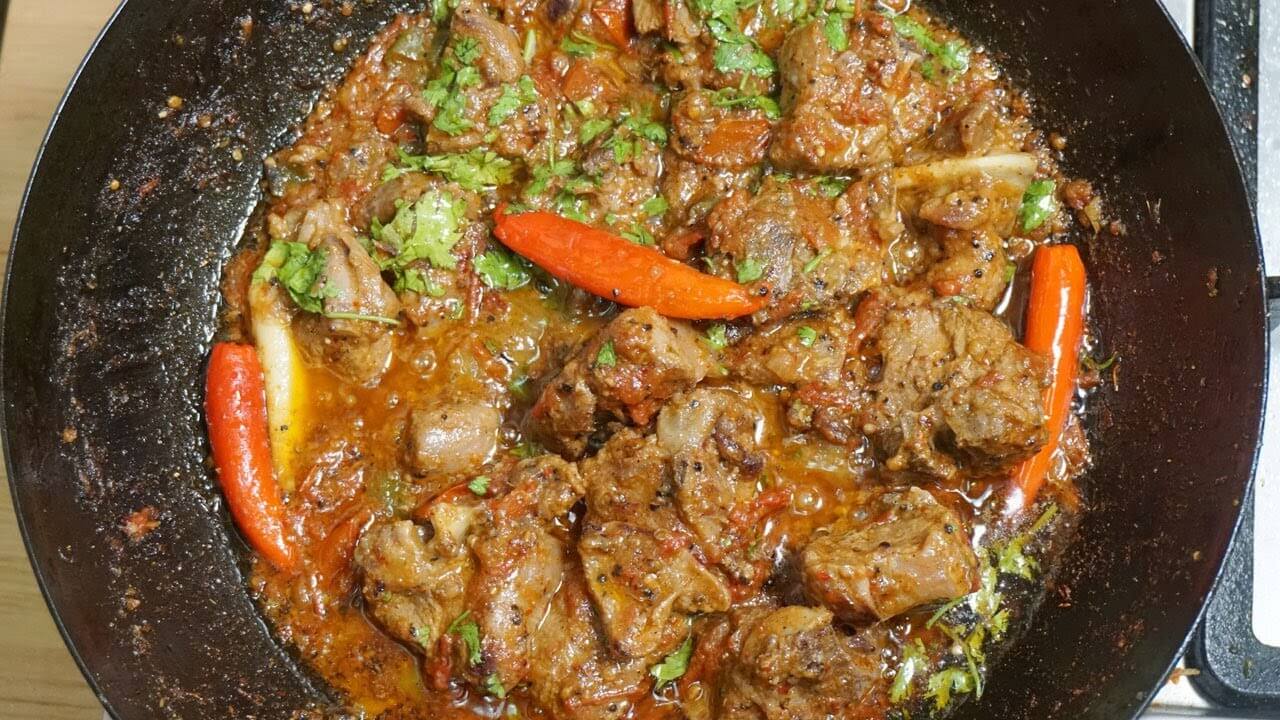
Beef Peshawari Karahi: Similar to the mutton version, Beef Peshawari Karahi comprises succulent pieces of beef cooked in a karahi with tomatoes, garlic, ginger, green chilies, and a medley of spices. The beef is tenderized and infused with the robust flavors of the spices, creating a hearty and satisfying dish that pairs well with naan or rice.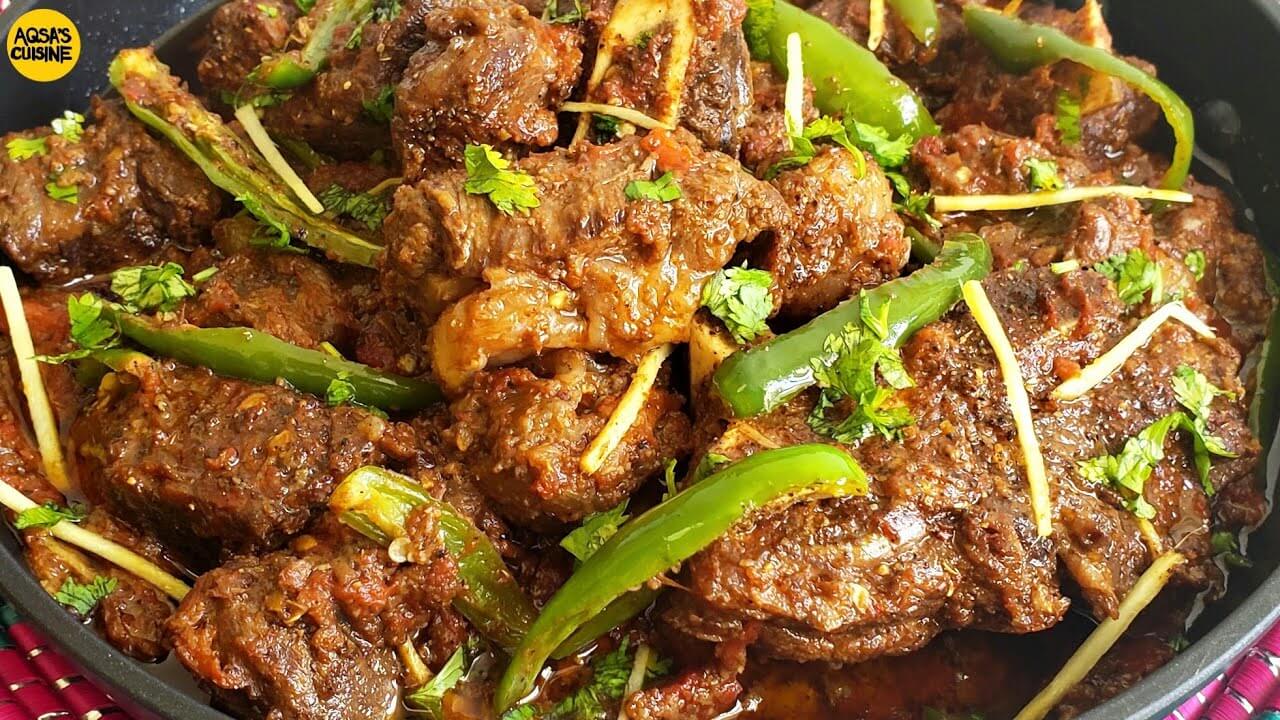
Peshawari Special Karahi: Peshawari Special Karahi is a dish that combines a unique mix of meats, often featuring a blend of chicken, mutton, and beef cooked together in a karahi with tomatoes, spices, and herbs. This dish offers a delightful medley of flavors from different meats, creating a rich and diverse taste experience.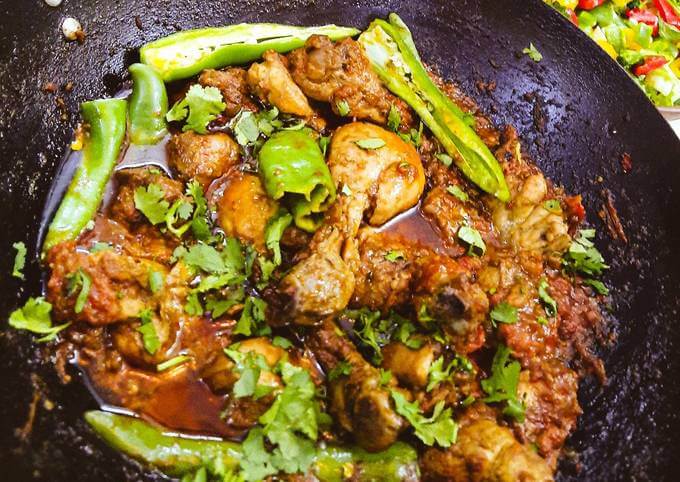
Peshawari Seekh Kebab: Peshawari Seekh Kebab consists of spiced minced meat, often beef or chicken, molded onto skewers and grilled to perfection. The meat is blended with onions, herbs, and a mix of spices like coriander, cumin, and red chili powder. These kebabs are known for their smoky flavor and tender texture, often served with naan and chutneys.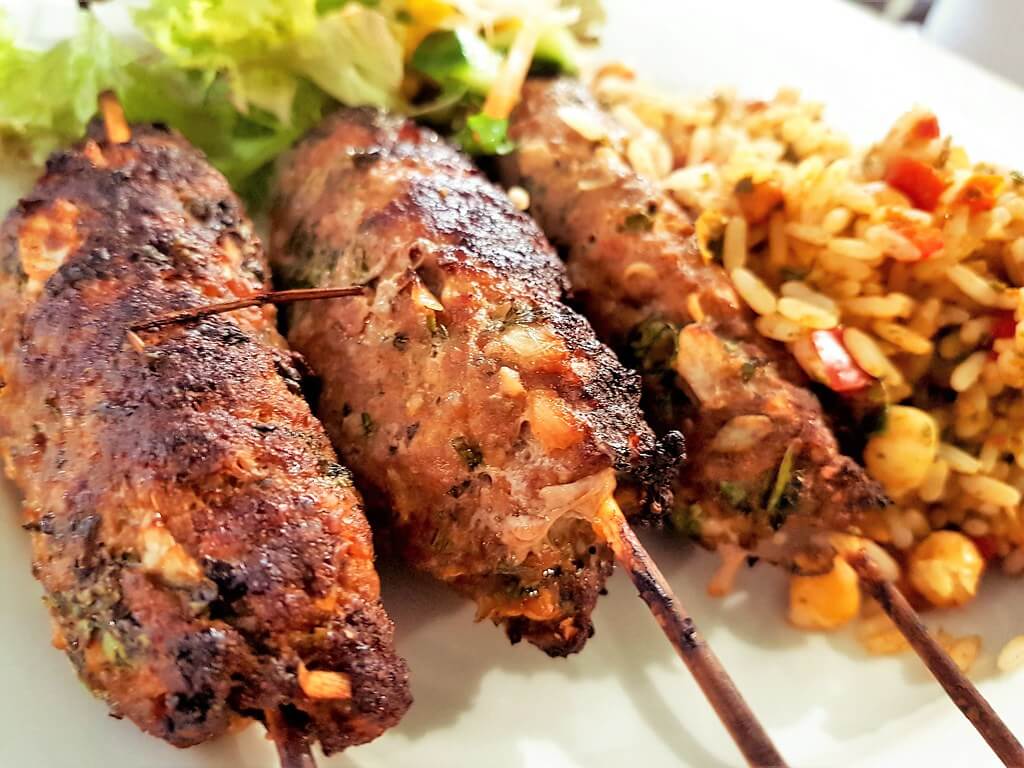
Peshawari Falooda: Peshawari Falooda is a delightful dessert beverage made with vermicelli, rose syrup, basil seeds, and ice cream. It’s a refreshing and sweet concoction enjoyed during hot summer days, offering a delightful mix of textures and flavors.
History and Culture
Culinary Heritage of Food in Peshawar
Peshawar’s culinary heritage is a captivating tapestry woven from the threads of diverse cultural influences spanning centuries. Rooted in history and shaped by a confluence of civilizations, the city’s cuisine stands as a testament to its rich and dynamic past. The flavors of food in Peshawar echo the culinary legacies of the Mughals, Pashtuns, Afghans, and Central Asians, each contributing distinct elements that have amalgamated into a unique gastronomic identity.
The Mughal era left an indelible mark on Peshawar’s cuisine, introducing a refinement of flavors and intricate cooking techniques. The use of aromatic spices, like saffron, cardamom, and cloves, along with the incorporation of rich gravies and slow-cooking methods, reflects the opulence and sophistication synonymous with Mughal cuisine. These influences linger in Peshawar’s dishes, infusing them with a royal touch and depth of flavor.
Pashtun and Afghan culinary traditions have significantly shaped the hearty and robust nature of food in Peshawar. The Pashtun emphasis on grilled meats, such as the famous Chapli Kebabs and Sajji, showcases a mastery of spices and grilling techniques. Meanwhile, Afghan influences, evident in dishes like the Afghan Pulao, bring a harmonious blend of sweet and savory elements, exemplifying the fusion of flavors that define the region’s cuisine.
The intermingling of Central Asian culinary practices further enriched Peshawar’s gastronomy. The use of dried fruits, nuts, and a melange of herbs and spices adds depth and complexity to dishes like Kabuli Pulao, symbolizing the cross-cultural exchanges that have shaped the city’s food landscape.
Culinary Traditions Reflecting Peshawar’s Culture
Beyond mere sustenance, food in Peshawar embodies a cultural identity deeply rooted in traditions, rituals, and community bonds. Communal dining holds paramount importance, symbolizing unity and solidarity within families and communities. The concept of “dastarkhwan” (dining spread) epitomizes this communal approach to dining, where individuals sit together on floor mats to share meals, fostering a sense of togetherness and kinship.
Traditional feasts and celebrations, such as weddings and religious events, serve as occasions to showcase the region’s culinary prowess. Lavish spreads featuring an array of dishes, from aromatic Pulao to succulent kebabs and rich gravies, are prepared with meticulous care, honoring guests and reinforcing cultural values of generosity and hospitality.
Hospitality practices in Peshawar revolve around offering guests a gastronomic experience steeped in warmth and cordiality. The tradition of “pehli” (first) and “doosri” (second) servings during meals signifies the host’s insistence on ensuring guests are well-fed and satisfied, underscoring the deep-rooted cultural reverence for hospitality.
Tips and Tricks
Navigating Peshawar’s Food Scene
Exploring the vibrant food scene of Peshawar can be an adventure in itself. To savor the most authentic flavors, venture into local eateries like “Namak Mandi” for an exquisite variety of kebabs or “Food Street” to indulge in a myriad of street food delights. Embrace the bustling atmosphere of Qissa Khwani Bazaar, where traditional tea stalls and local vendors offer an array of aromatic dishes. For a taste of the freshest produce and spices, visit Chowk Yadgar’s bustling markets, an ideal spot for a sensory immersion into Peshawar’s culinary offerings.
Home Cooking Insights for Authentic Peshawari Dishes Recreating the essence of food in Peshawar in your kitchen can be a delightful culinary journey. Start by sourcing high-quality spices, such as freshly ground cumin, coriander, and aromatic cardamom, from local specialty stores or markets. Incorporate traditional cooking techniques, like slow-cooking for rich gravies and marinating meats with yogurt and indigenous spices for robust flavors. Experiment with dishes like Chapli Kebabs or Peshawari Pulao, ensuring to balance of the distinctive spices to replicate the authentic taste of Peshawari cuisine at home.
Ingredients Defining Peshawari Cuisine
Key Ingredients Shaping Flavors The essence of food in Peshawar lies in its key ingredients that infuse dishes with depth and character. Spices like cardamom, cumin, and coriander form the backbone of many recipes, imparting aromatic and earthy flavors. Meats like mutton, beef, and chicken take center stage, meticulously cooked with a blend of spices to create succulent delicacies. Dairy products like yogurt and ghee enrich gravies and add a creamy texture to various dishes. Dried fruits and nuts, including almonds and pistachios, contribute to both taste and presentation, enhancing the overall sensory experience.
Regional Produce and Seasonal Specialties The authenticity of Peshawari dishes relies on locally sourced and seasonal produce. Fresh herbs like mint and cilantro, along with vegetables such as tomatoes and onions, play a vital role in adding freshness and vibrancy to meals. Explore the seasonal bounties of Peshawar’s markets, where ingredients like pomegranates, apricots, and mulberries enrich dishes with natural sweetness and tanginess. Celebrate the use of indigenous produce to craft dishes that encapsulate the true essence of Peshawari cuisine.
Sustainability and Local Sourcing
Embracing Sustainability in Peshawar’s Food Culture
Importance of Sustainable Practices Within the vibrant tapestry of food in Peshawar, a growing emphasis on sustainable food practices has emerged as a pivotal aspect. Local culinary establishments are recognizing the significance of embracing sustainable initiatives to preserve the region’s culinary heritage while safeguarding the environment. This shift towards sustainability underscores a commitment to sourcing locally, promoting organic produce, and fostering eco-friendly approaches in the culinary landscape.
Prioritizing Locally Sourced Ingredients In the heart of Peshawar, restaurants, and markets are championing the use of locally sourced ingredients, ensuring fresher and more authentic flavors while minimizing carbon footprints. By sourcing produce, meats, and spices from nearby farmers and artisans, these establishments not only promote the region’s agricultural economy but also reduce the environmental impact of transportation and storage. Embracing indigenous ingredients not only celebrates the rich diversity of local flavors but also fosters a stronger connection between food producers and consumers, reinforcing the community’s bond.
Supporting Sustainable Agriculture Initiatives Peshawar’s culinary scene has witnessed a surge in initiatives advocating for sustainable agriculture. Various organizations and restaurants actively support farmers engaged in sustainable farming practices, such as organic cultivation methods and fair-trade partnerships. These efforts not only ensure higher-quality ingredients but also contribute to preserving biodiversity, conserving natural resources, and promoting a healthier ecosystem for future generations.
Noteworthy Sustainable Culinary Destinations
Restaurants and Markets Promoting Sustainability In Peshawar’s dynamic food landscape, several establishments stand out for their dedication to sustainability and local sourcing practices. Restaurants like “Green Cuisine” and “Eco Bites” exemplify this commitment by prioritizing ingredients sourced directly from nearby farms and local producers. These venues showcase a range of traditional Peshawari dishes crafted from ethically sourced ingredients, fostering a sustainable dining experience that resonates with the essence of food in Peshawar.
Community Markets Embracing Local Producers The bustling markets of Peshawar, such as “Green Harvest Market” and “Eco-Friendly Bazaar,” serve as vibrant hubs promoting sustainability. These markets feature an array of organic produce, artisanal crafts, and ethically sourced goods from local farmers and small-scale producers. Through their support of community-driven initiatives, these markets contribute to the preservation of traditional farming practices and offer consumers an opportunity to engage with sustainable products that encapsulate the soulful essence of food in Peshawar.
Pairings and Recommendations
Beverage Pairings to Complement Food in Peshawar
Traditional Beverage Complements When indulging in the robust flavors of food in Peshawar, complement your culinary journey with traditional beverages that harmonize with the rich and diverse flavors of the cuisine. Start with a steaming cup of “Kahwa,” a spiced green tea infused with saffron, cardamom, and cinnamon. This aromatic tea not only cleanses the palate but also perfectly complements the spices in Peshawari dishes, offering a delightful harmony of flavors.
For a refreshing twist, explore the world of “lassis,” yogurt-based drinks available in various flavors like mango, strawberry, or traditional plain lassi. The cool and creamy texture of lassi provides a soothing contrast to the robust spices, making it an ideal accompaniment to the flavorful kebabs or biryanis.
Local and Alcoholic Options While Peshawar predominantly embraces non-alcoholic beverages, visitors interested in alcoholic options can explore select venues that offer international and regional choices. Some upscale restaurants might offer a limited selection of imported wines or spirits. However, it’s essential to respect local customs and norms regarding alcohol consumption in the region.
Additional Culinary Delights Beyond Highlighted Dishes
Exploring a Tapestry of Flavors Beyond the well-known classics, exploring the diverse array of lesser-known Peshawari dishes promises a culinary adventure like no other. Delve into the delectable “Kabuli Pulao,” a fragrant rice dish adorned with tender meat, raisins, and carrots, offering a unique blend of sweet and savory flavors. Alternatively, indulge in the aromatic “Peshawari Handi,” a slow-cooked curry boasting succulent meat simmered in a blend of spices and creamy gravy, evoking a symphony of indulgent tastes.
For a taste of Peshawar’s vibrant street food culture, venture into lesser-explored alleys to discover hidden gems like “Chapshoro,” a savory meat-filled pastry, or “Afghani Bolani,” stuffed flatbreads bursting with savory fillings. Don’t miss the opportunity to savor the delicate “Sheer Khurma,” a traditional dessert made with vermicelli, milk, and nuts, offering a sweet conclusion to your culinary exploration.
Unveiling Culinary Treasures Embarking on a gastronomic voyage in Peshawar entails discovering the nuances and intricacies of its lesser-known culinary treasures. From soul-warming stews to tantalizing street food, each dish carries a story, unveiling the multifaceted flavors that encapsulate the rich heritage of food in Peshawar. Embrace the opportunity to expand your palate and uncover the hidden delights that contribute to the diverse culinary tapestry of the region.
Cultural Significance
Food in Peshawar: A Cultural Emblem
Symbolic Significance in Cultural Identity Food in Peshawar transcends mere sustenance; it is an integral part of the city’s cultural identity, interwoven with traditions, values, and the spirit of togetherness. Culinary traditions serve as a mirror reflecting societal norms and cultural ethos, shaping the tapestry of daily life. The act of preparing and sharing meals embodies a deep-rooted sense of hospitality, generosity, and communal harmony that defines the essence of Peshawari culture.
Culinary Expressions of Hospitality and Social Bonds Hospitality is ingrained in the fabric of Peshawar’s social fabric, and food plays a pivotal role in expressing warmth and hospitality to guests. The tradition of “dastarkhwan,” where meals are laid out on floor mats for communal dining, embodies the essence of inclusivity and camaraderie. Offering food to strangers and guests alike is considered a gesture of respect and kindness, fostering connections and strengthening social bonds among individuals from diverse backgrounds.
Culinary Festivals and Celebrations
Food-Centric Festivities Throughout the year, Peshawar resonates with vibrant celebrations where food takes center stage, elevating cultural traditions and bringing communities together. One such celebration is “Eid-ul-Adha,” the Festival of Sacrifice, where families gather to commemorate the occasion by sharing sacrificial meat and preparing elaborate feasts. Traditional dishes like “Sajji,” succulent roasted meat, and aromatic “Peshawari Pulao” grace the dining tables, symbolizing the spirit of sharing and unity.
Another significant festival is “Jashn-e-Baharaan,” the Spring Festival, celebrated with zest and fervor. During this festive period, locals revel in the abundance of fresh produce and seasonal delights. Streets come alive with vendors selling delicacies like “Sheer Khurma,” a sweet vermicelli pudding, and “Gulab Jamun,” sweet fried dumplings soaked in sugar syrup, symbolizing the arrival of spring and new beginnings.
Rituals and Customs in Culinary Celebrations These festivals are not just about the food; they are an embodiment of cherished rituals and customs passed down through generations. Families come together to prepare traditional dishes, following age-old recipes and methods, imparting cultural significance to each culinary creation. The exchange of homemade sweets and dishes among neighbors and friends during these festivities symbolizes goodwill and solidarity, reinforcing the sense of community and shared heritage.
Food in Peshawar isn’t solely about flavors and ingredients; it is a cultural language that narrates stories of tradition, kinship, and the unifying spirit of celebration. It’s an invitation to partake in the vibrant tapestry of Peshawari culture, fostering a deeper appreciation for the significance of food in shaping social connections and preserving cultural heritage.
Conclusion
In concluding our journey through the tantalizing world of food in Peshawar, it’s evident that the city’s culinary landscape is an intricate tapestry woven with diverse flavors, historical legacies, and cultural significance. Peshawar’s food isn’t just about taste; it’s a reflection of the city’s soul, encompassing a rich heritage shaped by centuries of cultural exchange and culinary craftsmanship.
The culinary heritage of Peshawar, influenced by Mughal, Pashtun, Afghan, and Central Asian traditions, presents a mosaic of flavors and techniques. Each dish, from the aromatic Peshawari Pulao to the robust Chapli Kebabs, tells a story of the region’s history and cultural amalgamation.
Furthermore, food in Peshawar isn’t merely sustenance; it’s a cultural emblem that signifies hospitality, communal bonding, and shared values. It embodies the warmth of sharing meals on “dastarkhwans” and the joy of celebrating festivals with culinary delights that bind communities together.
As we immerse ourselves in the vibrant flavors and culinary treasures of Peshawar, let’s embrace the diversity and richness that this city has to offer. From savoring the aromatic spices to relishing the generous hospitality, every bite embodies the essence of Peshawar’s cultural heritage.
I encourage you to explore the bustling markets, embrace the traditional eateries, and indulge in the lesser-known culinary gems that define the unique identity of food in Peshawar. Let the flavors linger on your palate, and may this culinary journey ignite an enduring appreciation for the rich tapestry of Peshawar’s gastronomic heritage, inviting you to relish its flavors and cultural nuances time and again. Truly, food in Peshawar is an invitation to savor not just the taste but the heart and soul of a vibrant

